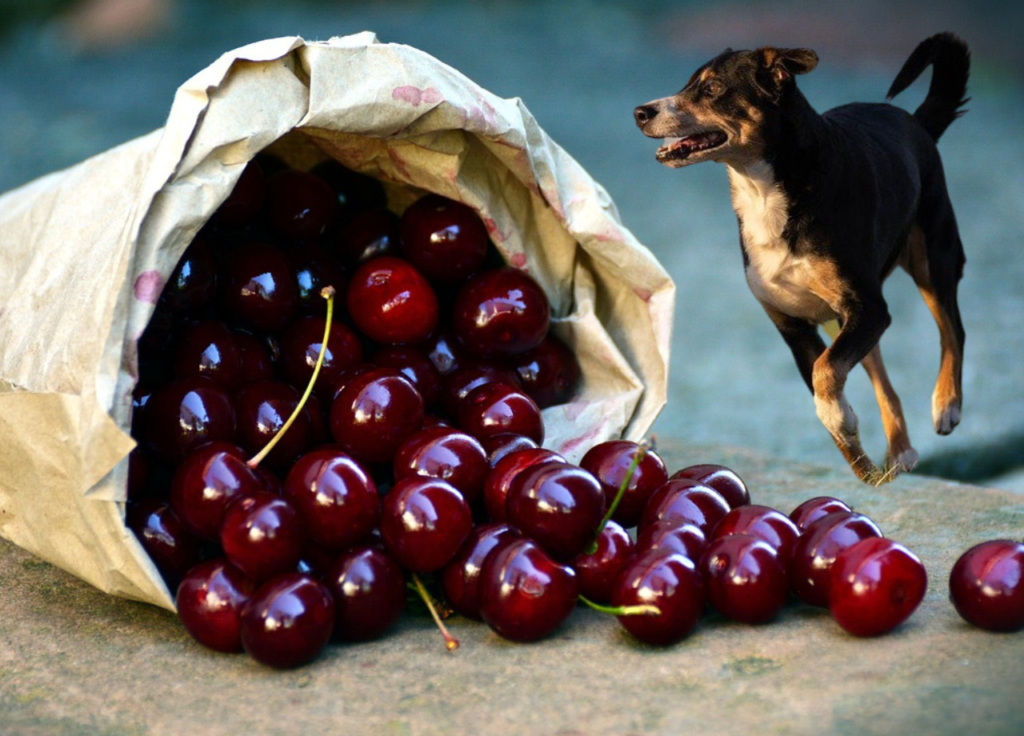In this article, we will investigate a fascinating topic that has caught the interest of many pet owners: can dogs eat cherries? As responsible pet owners, we are always worried about what our pets eat and whether it is safe. Cherries are popular among humans due to their enticing taste and beautiful hues. But what about our four-legged friends? Can they devour this delectable dessert without repercussions?
Join us as we investigate the possible hazards of giving cherries to dogs and any potential health advantages they may provide. We will offer useful information to help you make educated choices regarding your dog’s nutrition. So let’s investigate the strange case of dogs and cherries together!
The Potential Risks of cherries for dogs
While cherries are a tasty and nutritious snack for humans, they may be dangerous to dogs. Here are some of the possible hazards of cherries and how they might harm dogs:
1. Choking Hazard: Cherries contain pits (seeds) that dogs might readily ingest, causing gastrointestinal obstructions or other issues.
2. Cyanide toxicity: Cherry pits contain trace levels of cyanide, which, when consumed in significant numbers, may be hazardous to dogs. Cyanide disrupts oxygen transfer in the body, resulting in symptoms such as trouble breathing, dilated pupils, and even death.
3. Stomach disturbance or gastrointestinal distress: Cherries are heavy in fiber and natural sugars, which may disrupt a dog’s digestive tract and cause diarrhea or vomiting, particularly if ingested in large quantities.
4. Allergic reactions: Some dogs are allergic to cherries or certain components of cherries. Allergic responses may include itching, swelling, hives, and, in extreme instances, anaphylaxis.
5. Obesity and pancreatitis: Because cherries are naturally sweet, over-intake may lead to weight gain and dog obesity. Furthermore, the high sugar level might raise the risk of pancreatitis, which is pancreatic inflammation.
Given these hazards, it is suggested that dogs not be fed cherry. If your dog ingests cherries (pits and all), it is best to keep an eye on them for symptoms of discomfort or poisoning and to call your veterinarian right once.
The nutritional content of cherries and how is it good for dogs

Cherries are a delightful and healthy fruit that, when consumed in moderation, may provide various health advantages to dogs. However, it is crucial to remember that not all components of the cherry are suitable for dogs to ingest. The cherry meat is normally okay for dogs to eat, but the cherry pits, stem, and leaves contain cyanide, which harms dogs. As a result, it’s essential to remove the pits and stems before feeding cherries to your pet.
Cherries have the following nutritional value per 100 grams:
– 63 calories
16-gram carbohydrate
Fiber: 2 g
12 grams of sugar
One gram of protein
0.3 grams of fat
Vitamins: Cherries are high in vitamins A, C, and K.
Cherries are high in minerals such as potassium, calcium, magnesium, and manganese.
Cherries may provide a variety of advantages to dogs, including:
1. Antioxidant properties: Cherries include a variety of antioxidants, including anthocyanins, which may help lower oxidative stress and protect cells from harm.
2. Anti-inflammatory qualities: Certain components in cherries, such as anthocyanins and flavonoids, have anti-inflammatory activities that may help decrease inflammation and alleviate pain in dogs suffering from arthritis.
3. Promote heart health: Cherries are low in fat and cholesterol while high in potassium, which benefits dogs’ heart health and blood pressure regulation.
4. Strengthen the immune system: The vitamin C concentration of cherries may aid dogs’ immune systems, promoting optimum health and lowering the risk of illness.
5. Help with digestion: Because cherries include a modest quantity of dietary fiber, they help aid healthy digestion and contribute to regular bowel movements in dogs.
Recommended: Can dogs Eat Guava
Because of their natural sugar content, cherries should only be given to dogs as an infrequent treat and in moderation. Moreover, if your dog has any underlying health issues or is taking drugs, you should contact a veterinarian before introducing cherries to their diet.

While cherries are a tasty and healthful treat for humans, it’s vital to use care while sharing them with your canine partner. Here are several safe ways to give your dog cherries:
1. Remove the pit: Cherries have pits that may cause choking and harm to dogs. Before distributing the cherries, be careful to pit them since the pit may cause intestinal obstruction or cyanide poisoning if consumed.
2. Limit the serving size: Because cherries are rich in natural sugars, they should be served in moderation. Excessive consumption might cause stomach distress or diarrhea. Give your dog a couple of cherries as a treat now and again.
3. Begin with modest amounts: If your dog has never tried cherries, introduce them slowly. Begin by offering them one or two cherries and observing their response.
4. Thoroughly wash the cherries: To remove pesticides or residues, rinse them in cold water. This will help protect your dog from harmful contaminants.
5. Serve as a topping or mix-in: Instead of serving the cherries individually, add them to your dog meals. You may slice them up and put them in with their meal or use them as a topping.
6. Freeze them: Frozen cherries are a delightful treat for your dog, particularly during the summer. Simply pit the cherries and freeze them before serving them to your pet.
7. Monitor for any adverse reactions: Keep a watch on your dog after they’ve eaten cherries for any unpleasant responses. You should stop giving cherries to your dog if you observe any indications of gastrointestinal trouble, such as vomiting, diarrhea, or abdominal pain.
Remember that every dog is different; some may be sensitive or allergic to specific foods, including cherries. Before introducing new items into your dog’s diet, always consult your veterinarian.
Can Dogs Eat Cherry Ice Cream?
Cherry ice cream, or any kind of ice cream, should not be given to dogs. While small amounts of plain vanilla ice cream might be okay for some dogs, cherry ice cream typically contains additional ingredients such as cherries, sugar, and possibly chocolate, which can harm dogs. Cherries can be dangerous for dogs, as the pits contain cyanide which can be toxic if consumed in large quantities. Additionally, ice cream is typically high in sugar and fat, leading to gastrointestinal upset, weight gain, or even pancreatitis in dogs. Sticking to dog-friendly treats and avoiding giving dogs ice cream or other human desserts is always best.
Conclusion
To summarize, although cherries are a delightful and healthy fruit for humans, it is essential to be cautious while giving cherries to our animal companions. While cherries provide health advantages like antioxidants and vitamins, they also have concerns, including choking hazards and cyanide poisoning. Before treating your dog cherries, you should contact a veterinarian. It is also vital to note that cherries should be consumed in moderation without pits or stems. Finally, the health and safety of our canine friends should always come first.

